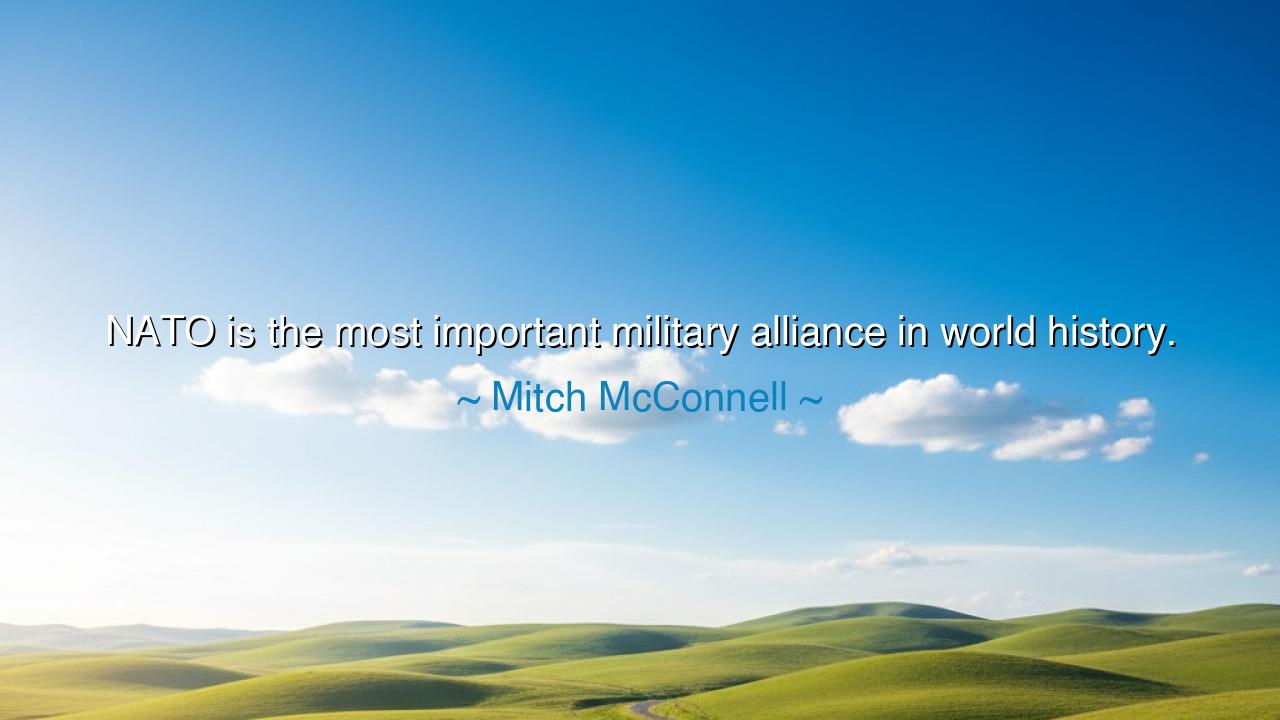
NATO is the most important military alliance in world history.






Mitch McConnell, a man seasoned by the tempests of politics and the long memory of nations, once declared: “NATO is the most important military alliance in world history.” In this statement lies not mere praise, but a recognition of unity forged from the fires of conflict, of human resolve rising above ruin. His words recall an age when the world trembled beneath the shadows of war and tyranny — when nations divided by language and culture chose, for once, to stand together rather than apart. The North Atlantic Treaty Organization, born in the aftermath of the Second World War, stands not only as a fortress of armies but as a testament to the power of cooperation, of men and women who refused to let the world descend again into darkness.
The meaning of this quote reaches beyond military strength or political convenience. When McConnell calls NATO the most important alliance in history, he speaks of an achievement far greater than steel or strategy — he speaks of trust between nations, of a covenant written not only on paper but in the hearts of free peoples. For never before in the story of humankind had so many sovereign powers chosen to bind themselves, not for conquest, but for defense, peace, and shared destiny. From the ashes of destruction, they created something enduring — an alliance whose purpose was not to dominate, but to deter; not to enslave, but to safeguard liberty itself.
The origin of this truth lies in the dark years following 1945. The world had seen two global wars within a generation, and the soil of Europe was soaked with the blood of millions. From the smoldering ruins rose the realization that peace could no longer be left to hope or chance. Thus, in 1949, twelve nations signed the North Atlantic Treaty — an oath of mutual protection, declaring that an attack on one would be an attack on all. It was an act both daring and humble — daring because it defied centuries of division, humble because it acknowledged that no single nation could secure peace alone. Over time, this pact grew to embrace more nations, expanding not by conquest but by invitation, by the will of people seeking security within a greater brotherhood.
To understand the greatness of NATO’s creation, one must remember Berlin, 1948. The city, divided and besieged, stood as the first battleground of the Cold War. When Soviet forces cut off all roads and railways into West Berlin, it seemed that the city — and the democratic spirit it represented — would perish. Yet the nations of the new alliance responded with courage unmatched: the Berlin Airlift, a monumental effort that saw Western pilots fly hundreds of thousands of missions, bringing food, fuel, and hope to those trapped within the Iron Curtain. For nearly a year, the skies above Berlin thundered with the sound of aircraft — not of war, but of mercy. It was the first great victory of NATO’s spirit, proving that unity could overcome oppression without a single shot fired.
Through decades of peril — the long chill of the Cold War, the fall of the Berlin Wall, the wars of the Balkans, the terrors of modern extremism — NATO endured. It adapted, redefined, and renewed its purpose. Its strength lay not only in its weapons, but in its principles: collective defense, democratic governance, and the belief that the freedom of one is bound to the freedom of all. When the twin towers fell in 2001, and the world shook once again, NATO invoked Article 5 — the sacred promise of mutual defense — for the first time in its history. Soldiers from many nations stood together in the mountains of Afghanistan, proving that the alliance was not a relic of the past but a living testament to global solidarity.
McConnell’s words, then, are not simply the voice of a politician but the echo of a truth written in blood and courage: that NATO represents the highest achievement of human cooperation in the face of danger. For all its flaws, it has kept peace among the greatest powers of the world for over seven decades — something no empire, league, or confederation before it has done. In a world still haunted by ambition and tyranny, its existence remains a bulwark against the chaos of old. It reminds us that though nations may differ, their destiny is shared; that strength lies not in isolation, but in alliance; and that the shield of many is stronger than the sword of one.
The lesson, then, is clear: no civilization survives alone. Whether in politics, in communities, or in the quiet bonds between people, unity is the cornerstone of endurance. From NATO’s example, we learn that peace requires vigilance, and trust must be built through action, not words. Every generation must renew this covenant — to stand with others, to defend what is just, and to recognize that freedom, once lost, cannot easily be regained.
So, my children of this age, remember the wisdom in Mitch McConnell’s declaration. Do not see NATO merely as an alliance of nations, but as a symbol of what humanity can achieve when it turns its might toward preservation, not destruction. Just as soldiers once lifted supplies to a starving Berlin, so too must we lift one another in the battles of our own time — against fear, against division, against the shadows that seek to return. For peace is not a gift inherited; it is a duty renewed, and in unity — as in NATO’s enduring promise — lies the hope of the world.






AAdministratorAdministrator
Welcome, honored guests. Please leave a comment, we will respond soon